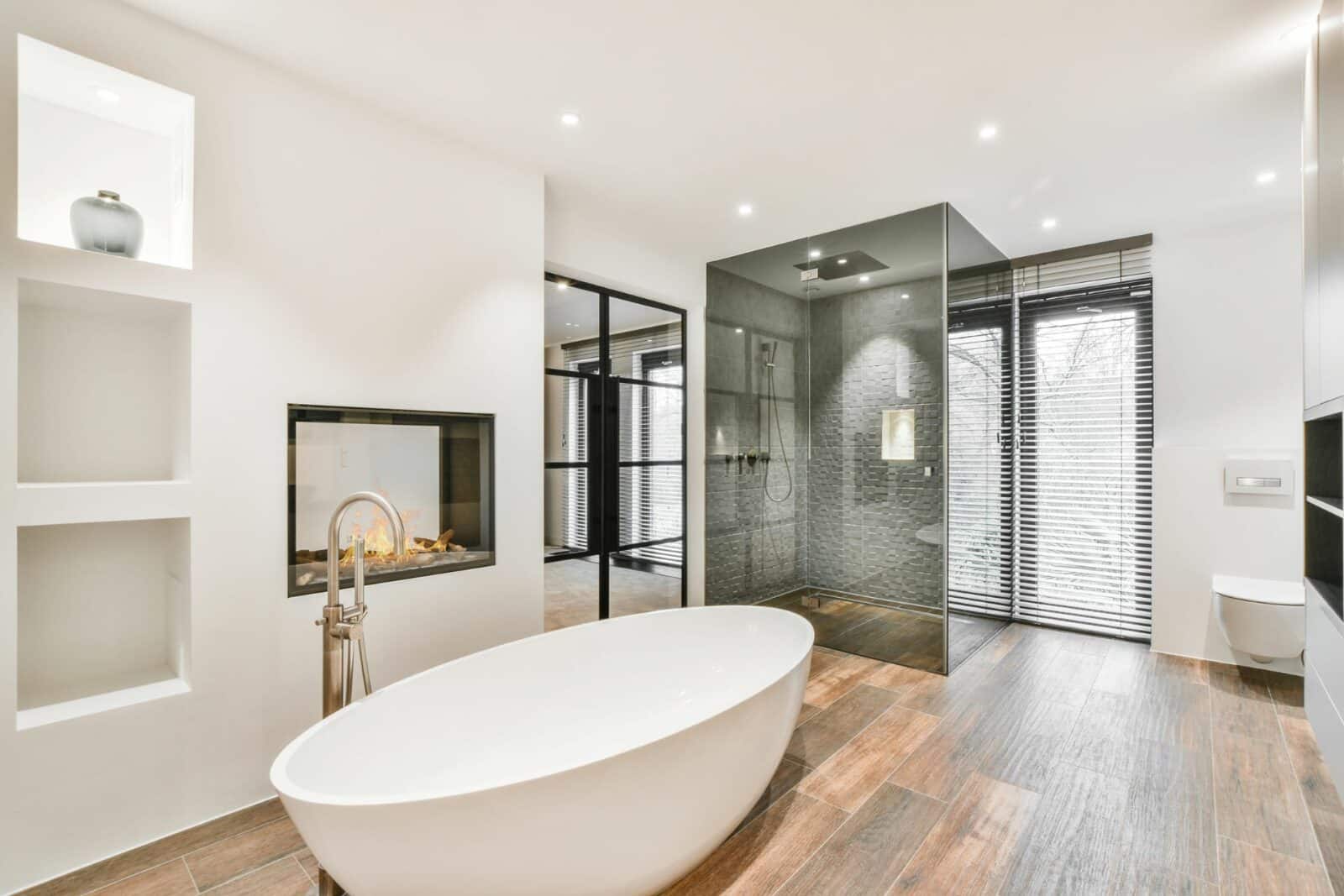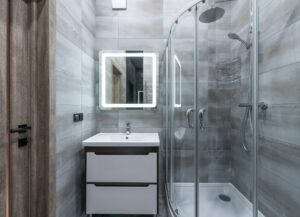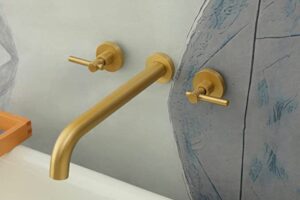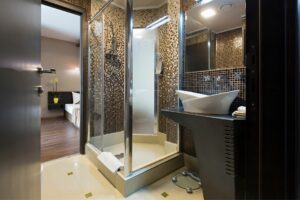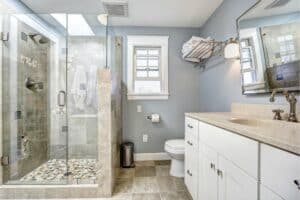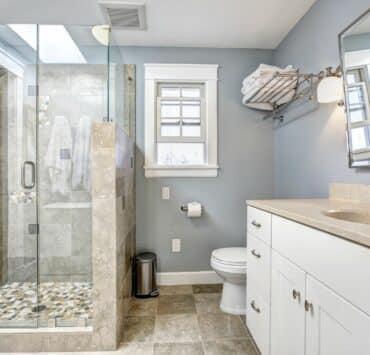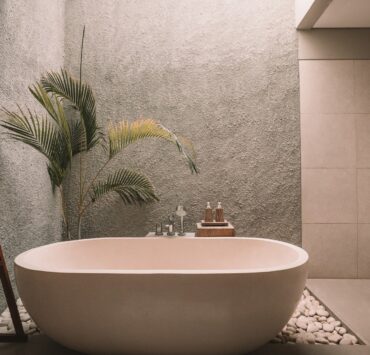The cost of a walk-in shower varies significantly, ranging from $1,150 to $8,000 due to the numerous available options. Unlike the standard bathtub-shower combo, a walk-in shower has the potential to add a touch of luxury to your bathroom. This guide will take you through the expenses associated with walk-in shower installation, whether you opt for a prefab solution or decide to choose custom tiling.
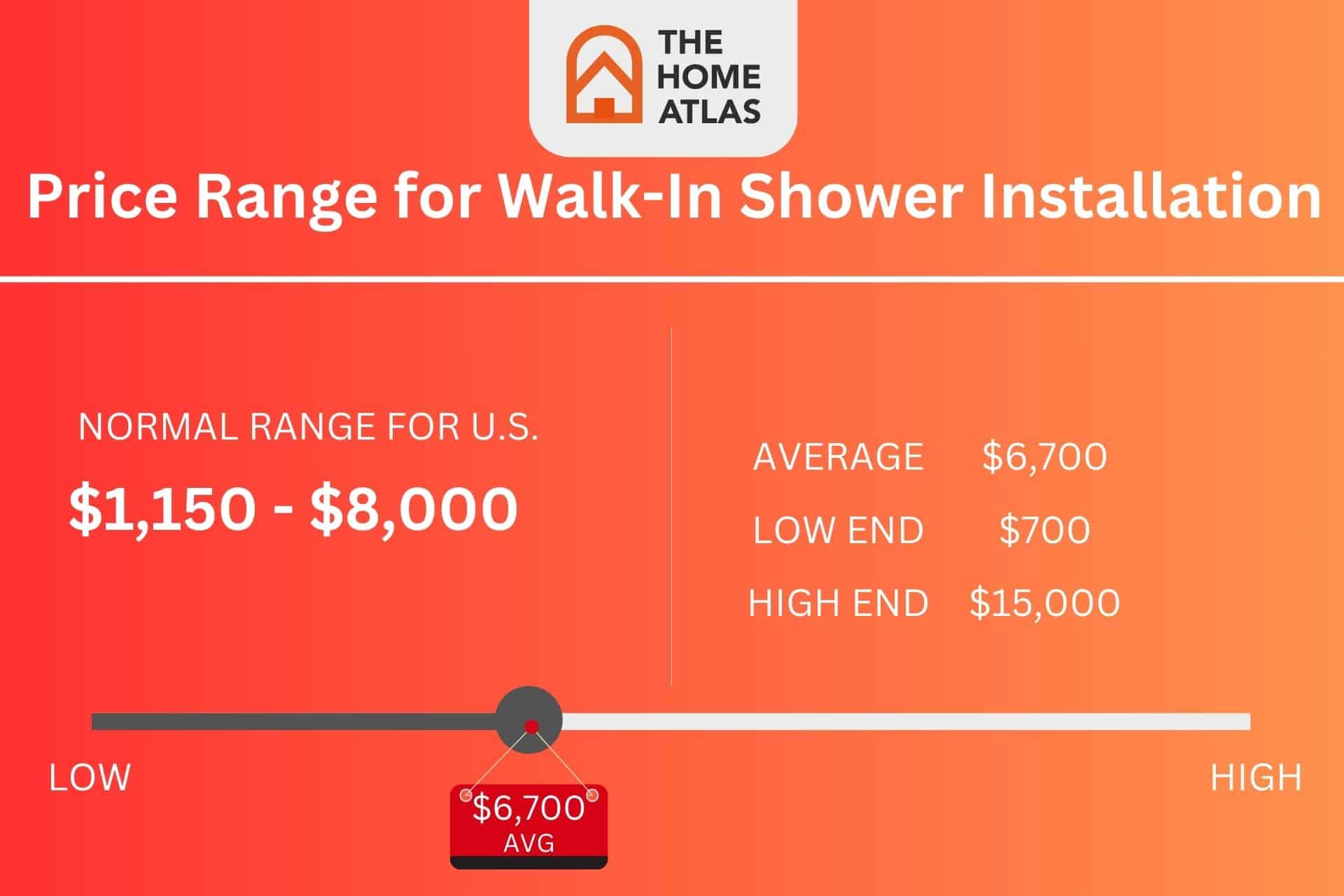
Breakdown of Walk-In Shower Costs
After making the choice for a shower instead of a bathtub, the cost of a walk-in shower can vary significantly due to the diverse styles available. Whether you opt for a fully customized shower featuring luxurious, high-end tiles with frameless glass doors or choose a more budget-friendly semi-prefabricated option, the final price is influenced by the aesthetic you aim to achieve. Here’s a breakdown of the costs associated with a walk-in shower.
Size Matters
- Standard-sized Shower: 32-by-32 inches
- Accessible Shower: 36-by-36 inches
When considering the size of your shower, the larger the space, the higher the cost. Choosing a standard-sized shower, like the 32-by-32 inches option, can save on labor expenses as it easily fits into existing spaces. An accessible shower, measuring 36-by-36 inches and meeting ADA standards, provides an inclusive option. Beyond these, customization is possible but entails additional costs.
Type of Shower
When selecting a shower, you’ll have to decide between a prefabricated or custom option.
Prefabricated shower kits, available in standard sizes, offer significant cost savings.
Budget-friendly prefab inserts can be found for as low as $300 to $500. In contrast, a custom tile shower, focusing on tile costs alone, can range from $1,800 to $6,800.
Materials
Opting for higher-end materials will inevitably raise the overall cost of the project. While custom showers offer a wider selection of materials, choices like cultured marble tend to be more expensive compared to tile. Here are some common materials along with their associated costs.
| Walk-In Shower Material | Average Cost |
|---|---|
| Acrylic insert | $500 – $2,000 |
| Fiberglass insert | $400 – $2,000 |
| Tile | $2 – $17 per sq. ft. |
| Marble | $10 – $35 per sq. ft. |
| Cultured granite, Corian, and other stone | $40 – $65 per sq. ft. |
Labor
A significant portion of the shower installation cost is attributed to labor. Homeowners typically pay contractors between $400 and $2,000, excluding material expenses. For intricate custom projects, labor costs are likely to increase.
Permits
Bathroom remodeling, particularly those involving plumbing, often necessitate permits, with most states requiring one. Budget approximately $250 for a permit, though the cost may reach as high as $500.
Walk-In Shower Costs Based on Type
The type of walk-in shower significantly influences its price. Prefabricated kits generally come with a lower price tag compared to custom walk-in showers. Your choice between the two types should align with your specific needs and budget considerations for your home.
Prefabricated Walk-In Shower
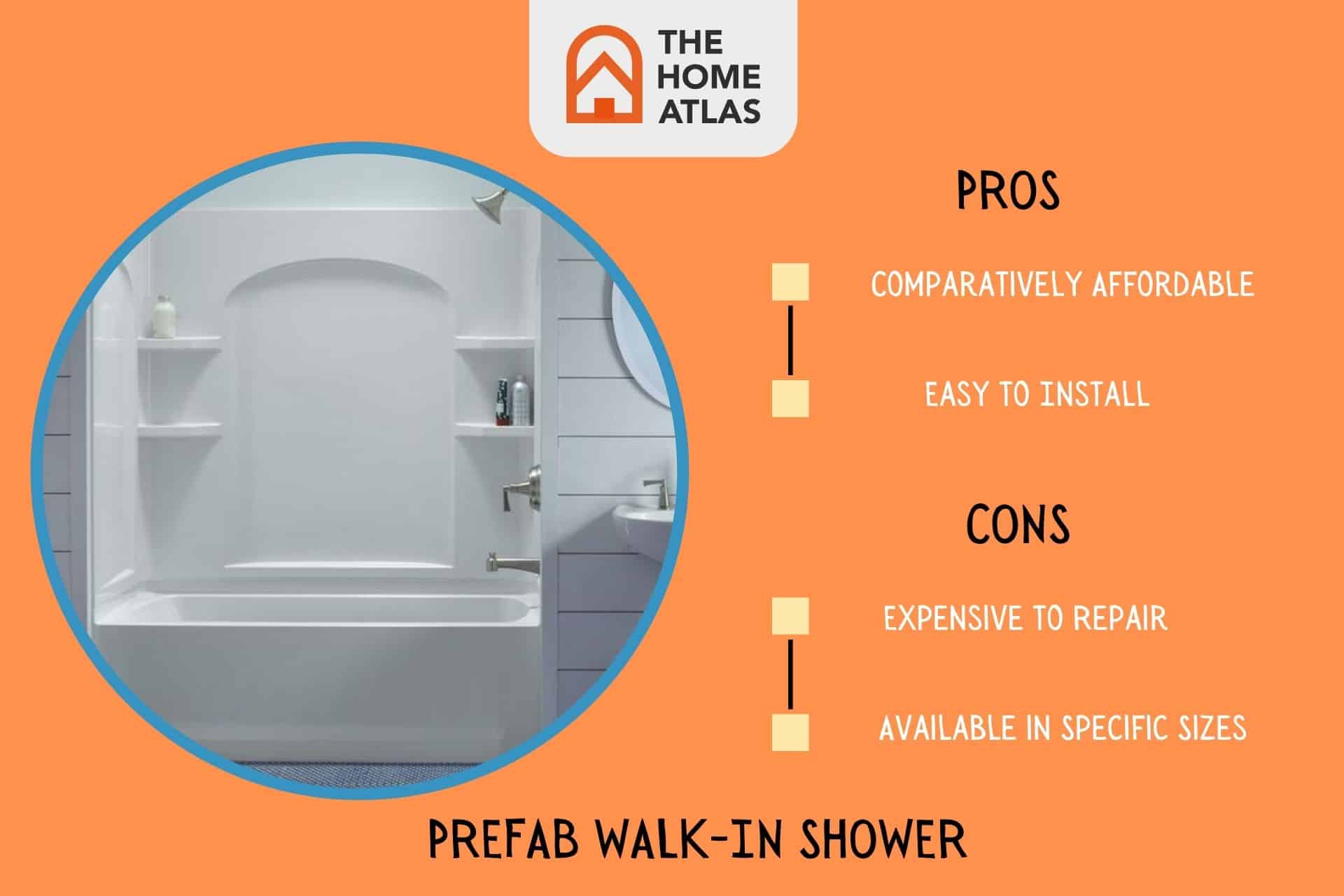
Prefabricated shower kits are easy to install and usually constructed from cost-effective materials. The majority of pre-manufactured shower stalls, often crafted from fiberglass or acrylic, have installation costs ranging from $700 to $3,000. Additionally, there are prefabricated models made from lightweight plastic available for as little as $300.
Custom Walk-In Shower
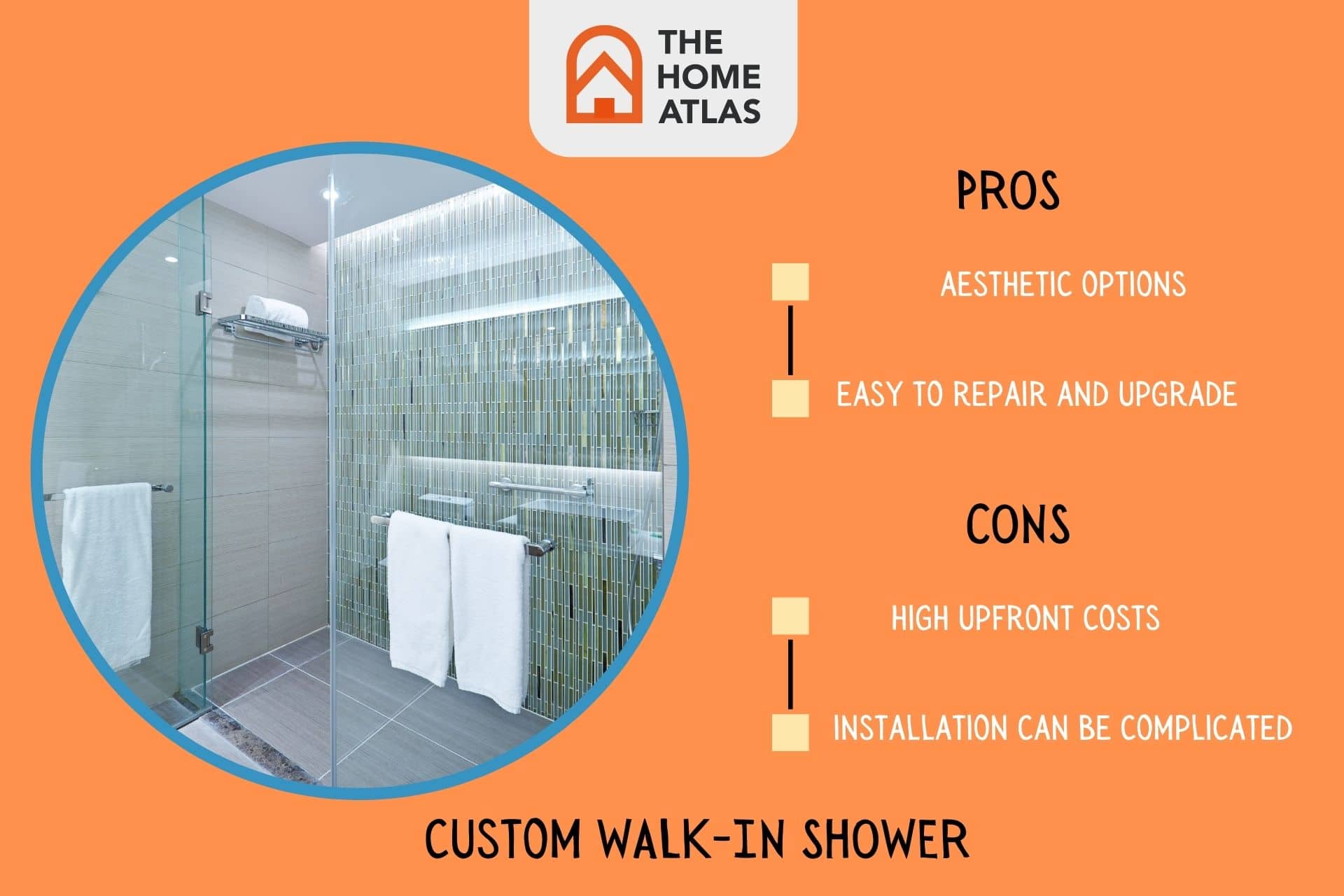
Custom walk-in showers come with a more varied price range, typically falling between $4,200 and $8,500. It’s important to note that the cost can significantly increase if high-end materials and fully customized features are chosen.
Homeowners favor custom showers due to their virtually limitless options. With the flexibility to use any water-tolerant tile, choose any size within the bathroom’s footprint, and incorporate a myriad of luxury features, custom showers provide a personalized and luxurious bathing.
Additional Considerations and Costs
The installation of your walk-in shower may involve various additional costs, depending on the nature of the job. Typically, installations necessitate some level of demolition and plumbing work, and in some cases, more extensive renovations. Here are factors that contribute to the overall price:
Conversion Costs
If converting a bathtub into a walk-in shower, additional expenses arise from removing the tub and preparing the new surface. Total costs for a tub-to-shower conversion generally range from $1,200 to $8,000, with potential increases for premium materials and custom tiling.
Demolition Costs
Demolition is a standard part of shower remodel costs, involving the removal of old fixtures like showers, tiles, and even non-load-bearing walls. Expect to spend $50 to $100 for old shower removal, $300 to $1,000 for removing a non-load-bearing wall, and $250 for construction debris removal.
Plumbing
Plumbing requirements vary based on the scope of the project. Adding plumbing for a shower typically costs $600 to $1,600, with higher expenses for new builds that involve plumbing for the entire bathroom. The average cost for rough-in plumbing is around $7,000.
Waterproofing
Custom showers may require waterproofing, with contractors installing a waterproof membrane below the custom shower pan. This can be a sheet membrane costing $500 to $1,000 or a liquid membrane ranging from $50 to $800, with additional labor costs.
Glass Shower Doors
Installing chic glass shower doors, whether frameless for a modern touch or traditional, incurs costs ranging from $550 to $1,400.
Curbless Walk-In Shower
Prefab showers usually come with a 7-inch curb, but opting for a curbless design necessitates custom work. Creating a curbless shower involves extra labor, ensuring proper floor slope for drainage. A custom shower pan for a curbless design can cost around $2,500.
Additional Accessibility Enhancements
Opting for a walk-in shower can offer increased accessibility compared to traditional and open bathtubs. If anyone in your household requires modifications for improved accessibility, consult with your contractor to consider the following options:
Wider Entryway
Creating a broader shower door or entryway aligns with the guidelines of the Americans with Disabilities Act (ADA), which recommends an entry width of at least 36 inches.
Grab Bars
Installing grab bars can aid in the process of entering and exiting the shower, providing necessary support.
Seating Inside the Shower
Incorporating seating within the shower area enhances accessibility, accommodating individuals who may benefit from or require a seated position.
Repositioning Controls
Moving controls such as knobs, shower heads, and faucets closer to the door or within easy reach ensures convenient access for all individuals.
Money-Saving Tips for Walk-In Shower Installation
Opt for a Prefabricated Shower Kit
Prefabricated shower kits are a cost-effective solution, saving thousands compared to fully customized options.
DIY the Simple Tasks
If you’re a handy homeowner, consider tackling some installation aspects yourself, especially with prefab kits. Save on costs by handling tasks like curtain rod and shower curtain installation, or even taking on custom tiling after the waterproof membrane is in place.
Mind the Shower Pan, Especially for Custom Builds
For custom builds, installing a shower pan from scratch can be time-consuming. Save on labor by opting for a manufactured shower pan, which typically costs between $250 and $400. Reserve high-end tiles for the walls.
Skip Add-Ons and Upgrades
Trim costs by avoiding unnecessary add-ons and upgrades. Opt for a quality basic showerhead instead of splurging on luxury options. Choose practical materials like acrylic, fiberglass, or porcelain tile over more expensive options like marble or stone.
Frequently Asked Questions (FAQs) About Walk-In Showers and Accessibility
Q: Are walk-in showers a more accessible option than bathtubs?
A: Yes, walk-in showers are often considered a more accessible choice compared to traditional bathtubs.
Q: What accessibility modifications can be made to walk-in showers?
A: Several modifications can enhance accessibility, including creating a wider entryway, installing grab bars, adding seating inside the shower, and repositioning controls for easier reach.
Q: What is the recommended width for a walk-in shower entry, according to ADA guidelines?
A: According to the Americans with Disabilities Act (ADA), the entry to a walk-in shower should be at least 36 inches wide.
Q: How do grab bars contribute to accessibility in a walk-in shower?
A: Grab bars provide essential support for individuals entering and exiting the shower, enhancing safety and stability.
Q: Is seating inside a walk-in shower beneficial for accessibility?
A: Yes, incorporating seating within the shower area improves accessibility, catering to individuals who may require or prefer a seated position.
Q: Can controls like knobs, shower heads, and faucets be repositioned in a walk-in shower?
A: Yes, controls can be moved closer to the door or within easy reach, ensuring convenient access for all users.
Best Walk-In Shower Inspo for Your Next Remodel





